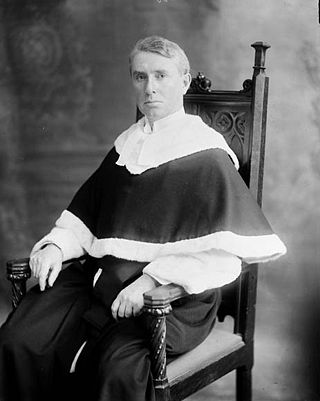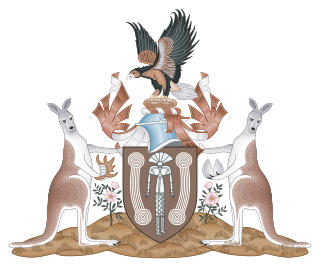
A judge is a person who presides over court proceedings, either alone or as a part of a panel of judges. In an adversarial system the judge hears all the witnesses and any other evidence presented by the barristers or solicitors of the case, assesses the credibility and arguments of the parties, and then issues a ruling in the case based on their interpretation of the law and their own personal judgment. A judge is expected to conduct the trial impartially and, typically, in an open court.
The Courts of England and Wales, supported administratively by His Majesty's Courts and Tribunals Service, are the civil and criminal courts responsible for the administration of justice in England and Wales.

The term magistrate is used in a variety of systems of governments and laws to refer to a civilian officer who administers the law. In ancient Rome, a magistratus was one of the highest ranking government officers, and possessed both judicial and executive powers. In other parts of the world, such as China, magistrate is a word applied to a person responsible for administration over a particular geographic area. Today, in some jurisdictions, a magistrate is a judicial officer who hears cases in a lower court, and typically deals with more minor or preliminary matters. In other jurisdictions, magistrates are typically trained volunteers appointed to deal with criminal and civil matters in their local areas.

Court dress comprises the style of clothes and other attire prescribed for members of courts of law. Depending on the country and jurisdiction's traditions, members of the court may wear formal robes, gowns, collars, or wigs. Within a certain country and court setting, there may be many times when the full formal dress is not used. Examples in the UK include many courts and tribunals including the Supreme Court of the United Kingdom, and sometimes trials involving children.

The Crown Court is the criminal court of first instance in England and Wales responsible for hearing all indictable offences, some either way offences and appeals of the decisions of magistrates' courts. It is one of three Senior Courts of England and Wales.
A recorder is a judicial officer in England and Wales and some other common law jurisdictions.

In England and Wales, a magistrates' court is a lower court which hears matters relating to summary offences and some triable either-way matters. Some civil law issues are also decided here, notably family proceedings. In 2010, there were 320 magistrates' courts in England and Wales; by 2020, a decade later, 164 of those had closed. The jurisdiction of magistrates' courts and rules governing them are set out in the Magistrates' Courts Act 1980.

There are various levels of judiciary in England and Wales—different types of courts have different styles of judges. They also form a strict hierarchy of importance, in line with the order of the courts in which they sit, so that judges of the Court of Appeal of England and Wales are given more weight than district judges sitting in county courts and magistrates' courts. On 1 April 2020 there were 3,174 judges in post in England and Wales. Some judges with United Kingdom-wide jurisdiction also sit in England and Wales, particularly Justices of the United Kingdom Supreme Court and members of the tribunals judiciary.
Stipendiary magistrates were magistrates that were paid for their work. They existed in the judiciaries of the United Kingdom and those of several former British territories, where they sat in the lowest-level criminal courts.

The Local Court of the Northern Territory is one of two levels of court in the Northern Territory of Australia. It has jurisdiction in civil disputes up to A$250,000, and in criminal cases in the trial of summary offences, and also deals with preliminary matters for indictable offences which are then heard by the Supreme Court of the Northern Territory. There are local courts held in Darwin, Alice Springs, Katherine, Tennant Creek, and some "bush courts" in remote locations.

Charles Mann was the first South Australian Advocate-General.

The High Court of Justice in London, known properly as His Majesty's High Court of Justice in England, together with the Court of Appeal and the Crown Court, are the Senior Courts of England and Wales. Its name is abbreviated as EWHC for legal citation purposes.

In England and Wales, magistrates are trained volunteers, selected from the local community, who deal with a wide range of criminal and civil proceedings. They are also known as Justices of the Peace. In the adult criminal court, magistrates decide on offences which carry up to twelve months in prison, or an unlimited fine. Magistrates also sit in the family court where they help resolve disputes that involve children, and in the youth court which deals with criminal matters involving young people aged 10-17. Established over 650 years ago, the magistracy is a key part of the judiciary of England and Wales, and it is a role underpinned by the principles of 'local justice' and 'justice by one's peers'.

The basis of the Bahamian Law and legal system lies within the English Common Law tradition. Justices of the Supreme Court, Registrars and Magistrates are all appointed by The Governor-General acting on the advice of the Judicial and Legal Service Commission, which is composed of five individuals who are headed by the Chief Justice as their chairman. The Chief Justice and the Justices of the Court of Appeal, including the President, are appointed by the Governor-General on the recommendation of the Prime Minister after consultation with the Leader of the Opposition. Once appointed, the salaries and other terms of appointment of the Chief Justice, Justices of Appeal and Justices of the Supreme Court cannot be altered to their disadvantage. Justices of the Supreme Court can serve until the age of 65 years and, where agreed among the judge, the Prime Minister and the Leader of the Opposition, may serve until the age of 67. Justices of Appeal can serve until the age of 68 years and, where agreed among the judge, the Prime Minister and the Leader of the Opposition, may serve until the age of 70 years. The law of The Bahamas makes provisions for the appointment of 12 Justices to the Bench of the Supreme Court, inclusive of the Chief Justice, and for five Justices of the Court of Appeal, inclusive of the President. The Chief Justice, as Head of the Judiciary, is an ex officio member of the Court of Appeal, but only sits at the invitation of the President.

Eleri Mair Rees is a Welsh judge. Since 18 June 2012, she has been the Resident Judge of Cardiff Crown Court and Recorder of Cardiff. She has been a circuit judge since 2002. She was called to the bar in 1975, and served as a Justices' clerk from 1983 to 1994 and as a stipendiary magistrate between 1994 and 2002.
The Honourable Arthur Child was a British lawyer, jurist and colonial administrator who was Chief Justice of St Lucia from 1890 to 1902.
Peter Walter Goldstone was a British solicitor and judge. Among the first solicitors to be appointed to the bench, in 1980 he became the first solicitor to sit in the High Court.
John Dominic Burns is an Additional Judge of the Supreme Court of the Northern Territory, a former Judge of the Supreme Court of the Australian Capital Territory and a former Chief Magistrate of the Australian Capital Territory.
Howard Charles Fraser Riddle. is a retired British judge who was the Senior District Judge for England and Wales. He was appointed to that office in 2010.
Sir Geoffrey de Paiva Veale was an English barrister and High Court judge, who sat in the Queen's Bench Division of the High Court from 1961 until his death in 1971.








